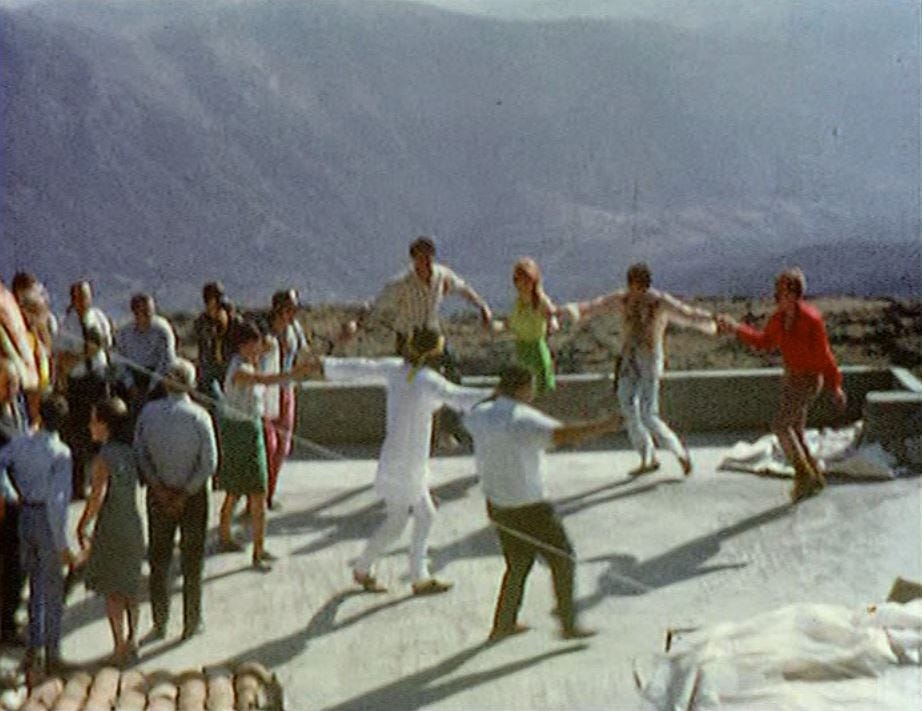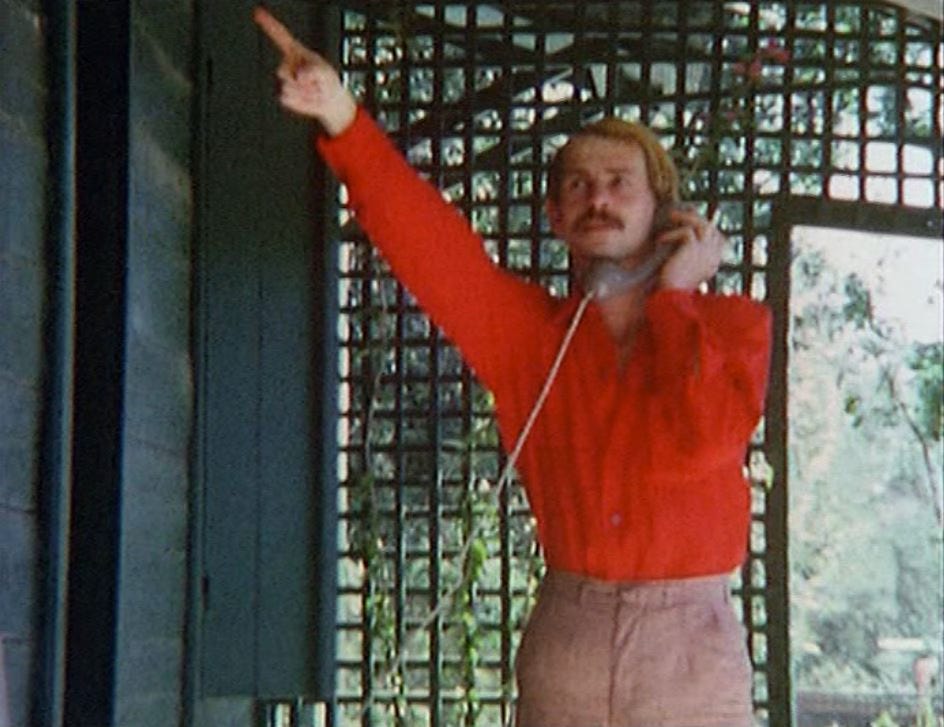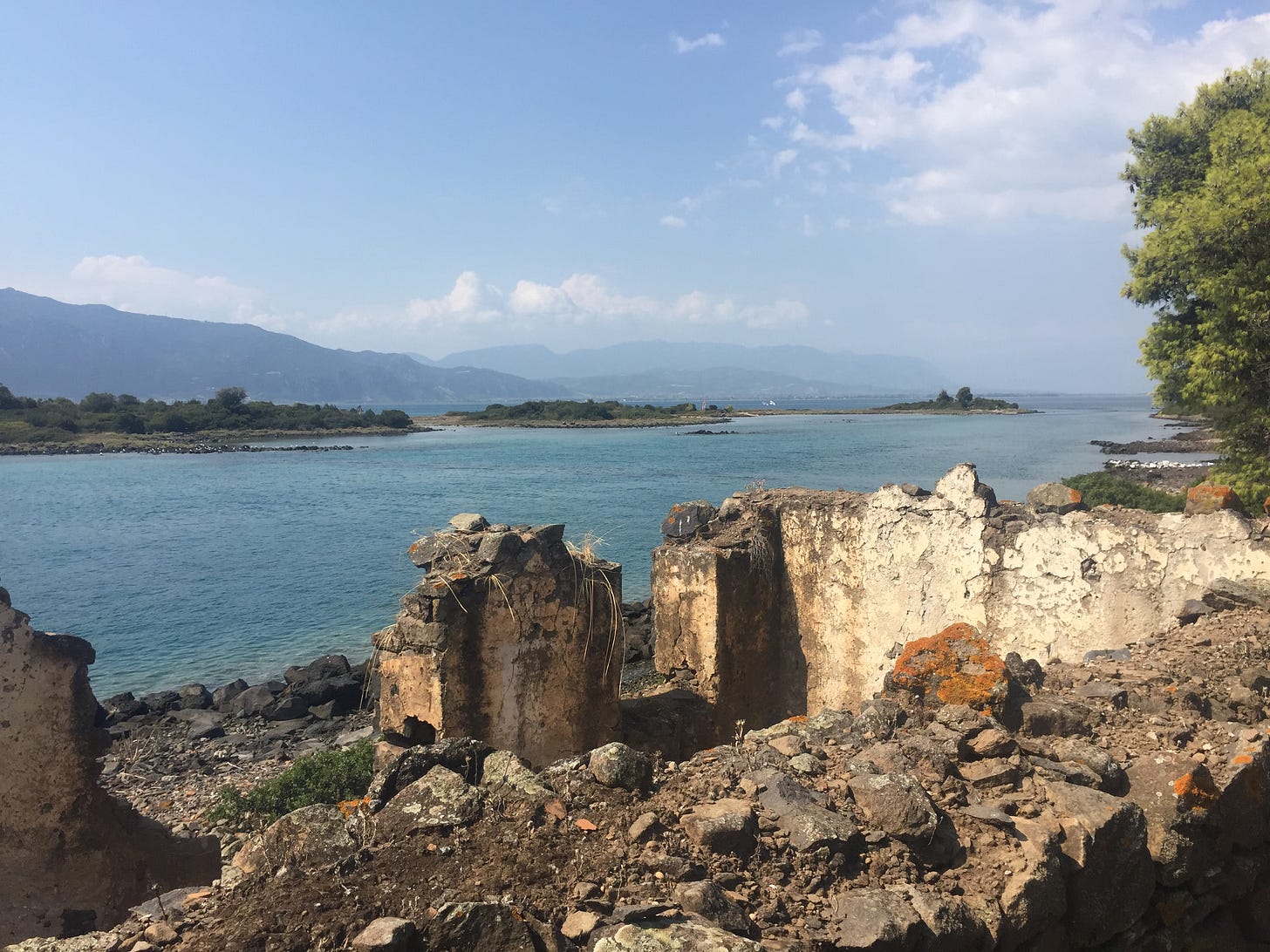Recap: what we’ve learned about the Beatles’ Greek island mystery
My attempts to clarify a historical footnote led me into a maze of phantom islands, financial strategies, secret services and cold war propaganda.

This Substack has its origins in my attempts to locate a Greek island that the Beatles had apparently visited and wanted to buy in 1967. When I first heard about these events in 2010, they seemed like an intriguing footnote to Beatles history, that might make an interesting article. But the apparently simple question of where this island was has evolved into something much bigger – leading me through government archives, Greek newspapers, island visits and interviews with people who worked with the group.
Since I started, I’ve found an island (in fact, a group of islands) that seems increasingly likely to be the place the Beatles wanted. But in itself, this is far from the most interesting aspect of this story. Because what initially sounded like a whimsical dream, typifying the idealism of the ‘summer of love’, turned out to have very surprising dimensions.
For one thing, it brought the Beatles – then at the height of their psychedelic phase – into the orbit of a military dictatorship that hated hippies. Exploring the political backdrop to this extraordinary juxtaposition helps shed light on the cold war tensions of the time, the impact of the Beatles on these, and attempts by politicians to harness the group’s allure. My investigations have also led me to research secret services and military societies, propaganda schemes and diplomatic dispatches. The story illuminates other lesser-known aspects of the Beatles’ story, too – such as their advisers’ strategies for taming chaotic finances, the bizarre mythologies that have developed around the group, and John Lennon’s lifelong fascination with islands and the sea.
The characters I’ve encountered include a British Member of Parliament offering PR advice to the Greek junta, and an influential lawyer – described as the “fixer for the British establishment” – who worked both with the Beatles and the UK prime minister. But above all, the events centre around Alexis Mardas – a self-styled Greek inventor who had rapidly found his way into the Beatles’ inner circle, offering his assistance through eye-catching ideas and impressive-sounding connections. This story turns on the mystery surrounding the identity of ‘Magic Alex’ as much as the island itself.
Read on to learn more – and click the links to the posts for deeper dives.
The island names that weren’t on maps
In 2010, I was researching a travel guide on the Greek island of Skiathos when I heard a local rumour that the Beatles had once wanted to buy a nearby islet. Where is 'Leslo', the Greek island the Beatles wanted to buy? sets out what I learned when I decided to look into the story more deeply. The Beatles had indeed visited Greece and wanted to buy an island there – but not much else about the events was clear.
Accounts by Beatles insiders describe the group making plans to buy a main island of around 80 acres with several smaller islands next to it, costing about £90,000. But this description was never connected to an actual location. And while the place is sometimes referred to as “Leslo”, there is no known Greek island with this name.
The mystery deepened when I found files in the UK National Archives relating to the story, including an application on behalf of the Beatles to buy the ‘property currency’ required for the planned island purchase. The description of the island in these papers is a close match for those in the books. But as I discuss in The confusing island names that aren't on any maps, the documents name the Beatles' target as “Aegos in Konstadinos” – another name that appears nowhere on maps.
With not one, but two names given for islands that apparently didn’t exist – one in an authorised biography, the other in official documents – the story was already far stranger than I had imagined.
‘Used as propaganda’
I was also realising that the political context of the island adventure made it something more complicated than the simple hippie fantasy it had initially appeared – since Greece had recently been taken over by a junta of army officers. From London's summer of love to Greece's military dictatorship explores the contrast between the Beatles' peace-and-love ideals and that repressive regime, which had banned long hair, miniskirts, and even the Beatles' own song She Loves You.
Despite this, it appears that there were at least some elements within the Greek government who supported the Beatles’ visit. Were the Beatles 'used as propaganda'? examines evidence that officials promoted the group's trip in an attempt to boost the country's flagging tourist industry.
‘Likely to attract publicity’
Equally fascinating was the way the Beatles’ plans created dilemmas for the British government. 'Likely to attract publicity': The cold war context of the Beatles' Greek island plans considers how Harold Wilson's Labour government was having to balance public outrage at the Greek junta against the political imperative to maintain relations with them. Whether the group realised it or not, this meant that the Beatles’ moves towards setting up a base in Greece constituted a notable intervention in a delicate geopolitical landscape. That in turn contributed to the complexity of the issues facing British mandarins and ministers – who in effect had the power to veto the plans.
The political relevance of high-profile visits to Greece is underlined by discussions that were happening at the time. Visits by 'British personalities': An MP's PR advice to the colonels reveals how as the Beatles’ plans were taking shape, the Labour MP Francis Noel-Baker was keen to make suggestions to the Greek junta about public relations and visits to the country by “British personalities”. As it happens, the MP shared some connections with Alexis Mardas, and owned an estate near islands the group are thought to have visited. But we can only speculate on whether his actions had any bearing on the Beatles’ Greek adventure.
One influential figure with a definite link to the events was the lawyer Arnold Goodman – “fixer for the British establishment” and a confidant to prime minister Harold Wilson. Lord Goodman: Lawyer to the Beatles - and the prime minister looks at how Goodman’s solicitors’ firm acted for the Beatles to help clear the administrative hurdles required to buy the island. This meant that as Lord Goodman was meeting fortnightly with the prime minister to discuss sensitive political issues, he or his colleagues were in effect making the case to the government to allow the Beatles to go ahead with the island plans. And all at a time when Britain’s relationship with Greece was regularly making the headlines.

The enigmatic Alexis Mardas
But while there’s a surprising amount of politics involved, it’s still not clear exactly how it all fits together. Learning more about Alexis Mardas, the Greek electronics enthusiast who organized the Beatles' trip, should help get us closer to some answers – but everything to do with him seems shrouded in uncertainty. This is partly due to Mardas’ own unreliability: his reputation for exaggeration is well-deserved. But researching The mystery of the Beatles’ ‘personal boffin’ Magic Alex, I found his character to be more complex than it is often portrayed, with the Beatles’ accountant Stephen Maltz speaking highly of Alexis’ charm and talents.
I also found evidence that Mardas’ claims of high-level connections had some basis in reality – discussed in Actor, architect, soldier...spy? The intriguing inner circle of Alexis Mardas. Stretching back to their shared roots in what is now Bulgaria, the Mardas family had connections to that of Constantinos Doxiadis, a globally influential architect. Alexis’ marriage to Doxiadis’ daughter Euphrosyne in 1968 gave him access to Greek high society.
And what about Mardas’ claim that his father worked for Greece’s secret police? A secret service connection? Argyris Mardas, IDEA and KYP explores the possibility that the agency in question was the country’s Central Intelligence Service (KYP) – which was closely associated with the military junta. While researching the service’s history, I discovered that an officer with the same name as Alexis’ father had been an important member of IDEA, a secret right-wing military organization with close links to KYP.
Fleshing out the story
I also unearthed some contemporary accounts that flesh out our knowledge of what the Beatles did in Greece. Day trippers: a rooftop gig in a Greek mountain village looks at Greek newspaper coverage of a day trip that was arranged for the Beatles before their island cruise departed. The group danced on a rooftop to traditional music, paddled in the sea, received an array of gifts and then had a visit to an ancient amphitheatre curtailed by unexpected crowds. Meanwhile, Where the Beatles went on their Greek cruise uses reports from the newspaper To Vima to trace the detailed movements of the group’s party around the islands.
Further evidence comes from a later account by Labis Tsirigotakis, the journalist who wrote those articles. How a reporter tracked down the Beatles in Greece follows the media veteran’s story of how he located the Beatles' Athens hideout and later nabbed an impromptu interview with John Lennon – who unleashed an impassioned tirade against the British and US governments.
Back to the island
According to Tsirigotakis, the island the group wanted was Tsougria near Skiathos – the place where I first heard this story. But personally, I’m not so sure. It doesn’t match the descriptions well – and certainly not nearly as well as another location nearby.
I realised this after looking more carefully at some topographical details in a memoir by Beatles insider Alistair Taylor. Revealed: the island the Beatles 'wanted to buy', explains how Taylor’s clues about sailing through a "natural canal" spanned by a lifting bridge pointed toward the Evian Gulf. As it happens, the two islands most frequently associated with the Beatles – Agia Triada and Tsougria – are located in or near this part of Greece. But as I conclude in Where was the Greek island the Beatles wanted? The evidence, neither of these is likely to have been the group’s main target.
In my view, the most compelling candidate is another nearby location. It’s never named in the insider accounts. But in A closer look at the Lichadonisia, I examine how this cluster of islands matches these descriptions almost perfectly. The main island, Monolia, is 85 acres big with a gently curving bay, stone houses, and olive groves. When I visited, it was easy to imagine the Beatles seeing this accessible yet remote-feeling location as the perfect escape.
New evidence has since emerged that reinforces this view. As I discuss in George Harrison on Monolia?, recent live performances by Sir Paul McCartney have included apparent footage of Harrison in the Lichadonisia islands – strengthening the case that these were indeed the focus of the group’s interest.
Facts, finances and fantasies
The question of where the island was, though, is ultimately less consequential than understanding how and why these events happened. And the more I investigated, the more I appreciated the wide range of factors that may have influenced them. 'Alex said they could pay less tax in Greece': the financial context of the Beatles' island plans reveals the serious financial issues at play. The Beatles’ advisers had come to the view that with UK income tax rates reaching 90%, the group would benefit from careful financial planning. According to their accountant Stephen Maltz, Alexis Mardas claimed he could help them “pay a lot less tax in Greece”.
But while that may have been music to a tax professional’s ears, I doubt it was much motivation for the Beatles themselves – who were surely more interested in the recreational and artistic possibilities. In my view, the group’s state of mind at this time is likely to have been a far bigger influence. Many accounts suggest that their desire for privacy and respite from the pressures of fame, after years of global touring and Beatlemania, was strong.
In particular, John Lennon had an ongoing fascination with island escapes. My post on John Lennon's island fantasies (the most-read so far – originally a presentation to a conference at Liverpool Hope University) discusses Lennon's enduring interest in islands, from his childhood separation from his seafaring father to his purchase of Dorinish island in Ireland, and his creative renewal in Bermuda months before his death.
Trying to establish the details of these events has also led me to consider broader questions about truth and accuracy in writing about the Beatles. Where does the island name 'Leslo' come from? describes how I tracked down the likely source of this name through archival research, highlighting how inaccuracies can become embedded in accepted narratives.
It may be that the name ‘Leslo’ has its ultimate roots in the bizarre urban legends that I look at in ‘Be at Leso’: the strange world of Beatles mythology. Meanwhile, Mistake or misdirection? The ‘Aegos in Konstadinos’ mystery asks whether the other island name I encountered could be one of the cases where mild subterfuge was used to help maintain privacy for the Beatles. There may one day be an answer to these questions. But as I discuss in Who was the ‘Swedish actress’ with the Beatles in Greece?, getting closer to solving one puzzle often only leads to others.
These posts touch on the broader question of how much we really know about the Beatles – and how we know what we think we know. While the details of the group’s story are discussed extensively, the facts are often still hard to pin down – and that’s before we even think about how to interpret them. Every writer has their own biases and blind spots. So who do we trust, and why?
An ongoing story
In the end, the Beatles never did buy a Greek island. The purchase negotiations ran into complexities – and in any case, the death of their manager Brian Epstein soon after the trip changed everything. But that doesn’t mean the episode isn’t significant. It captures the group at an important point in time – and a small lens can bring focus to much larger issues.
The wider relevance of these events is reflected in the interest and coverage they have generated beyond this Substack. In 2023 the peer-reviewed Journal of Beatles Studies published my article ‘Used as propaganda’: the Beatles’ Greek island plans and international politics. This was featured in a report by Helena Smith in the Observer newspaper, emphasising the events’ political dimensions. For Declassified, I looked at archive evidence that underlines how the British establishment prioritised political stability and commercial interests in Greece over democracy. And for Erin Torkelson Weber’s website, I discussed the historiographical aspects of the story.
I’ve also discussed my research on the podcasts Beatles Books and Gimme Some Truth.
My investigations continue, with new developments coming soon. If you’re enjoying my work, please share this post to spread the word, and subscribe to find out where it leads next.


